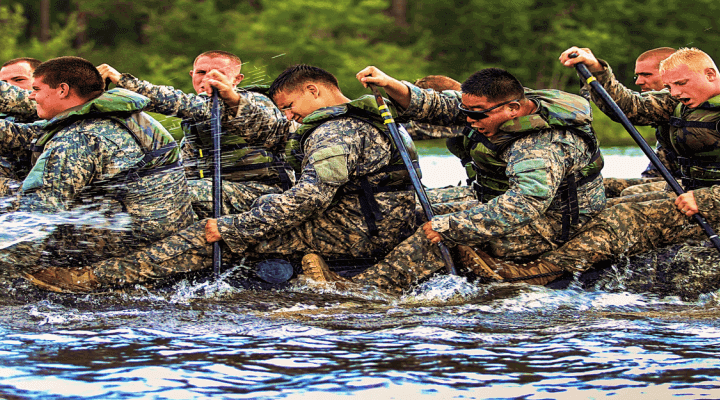If you’re a civilian leader looking to add skilled and motivated new employees to your team, you’re in luck if former non-commissioned officers (NCOs) are among your applicants. Through their military experience, NCOs (or petty officers if they served in the Navy) developed skills and professional qualities civilian leaders want more of in their organizations. Having previously served as both an NCO and an officer, I can attest that the skills I learned as an NCO were foundational to nearly every successful professional endeavor that followed. Here are just a few reasons why former NCOs, known as the backbone of the military, would be a valuable complement to your civilian team.
1. NCO’s Are the Original SERVICE LEADERS
NCOs enter military service between the ranks of E-1 through E-3 – depending on any college credit they earned before joining -and work their way up the leadership ladder. This means that they can relate, and are also relatable. They mentor, encourage and empower subordinates to perform at their personal best. When problems arise, they know how to work in partnership with subordinates to discover and implement solutions. NCOs tailor their leadership style to a team member’s motivation and abilities.
Instead of waiting until the annual appraisal is due, they provide continual and timely feedback on a regular (if not daily) basis. As they become more senior, NCOs support junior leaders who endeavor to foster similar environments of trust and teamwork. In addition to practical experience, NCOs also complete formal leaderships courses through their respective services’ professional military education programs. “I owe my Sailors leadership that they can depend on, trust, and follow.” – Navy Petty Officer Creed
2. NCOs Can Advise ALL LEVELS OF MANAGEMENT
NCOs are often the connection between senior leaders and operational teams. When leaders have questions about performance standards, productivity, safety issues or team morale, the NCO has the answers. If analyses don’t jive or recommendations have missing information, the NCO is asked to validate the methodology or provide the missing pieces. The NCO is the person consulted for his technical expertise, and often has experience speaking with leaders of all ranks in the chain of command. Put him in front of the CEO or the entry level employee – the NCO can talk to just about anyone and make meaningful connections. And his competence in his respective functional skill will build trust and confidence for senior decision makers who can rely on him for accurate information. “I serve as part of the vital link between my command (and all officers) and enlisted Marines.” – Marine Corps NCO Creed
3. NCOs Know How to OPTIMIZE RESOURCES
When I asked my daughter, who is an Air Force Technical Sergeant, what her biggest challenge as an NCO is, her answer was “doing more with less.” I was somewhat surprised- not because I perceived the Air Force to have a surplus of resources, but because 20 years ago Air Force NCOs faced the same challenge. That makes two generations – and likely more – who approach their mission strategies and tasks with the same mantra: economize and optimize your resources.
This regular mindset motivates the NCO to ensure equipment is scrupulously accounted for, is regularly maintained and in top working condition. The NCO writes and submits convincing justifications for additional resources should “fallout” money become available. They keep on top of personnel manning rosters and work schedules to ensure optimum coverage to exceed customer expectations, while keeping a watchful eye to ensure team members regenerate and don’t suffer burnout. “I will strive to know my subordinates and use their skills to the maximum degree possible.” – Air Force NCO Creed.
4. NCOs GET THINGS ACCOMPLISHED
I recently asked an old friend, who is also an Air Force Colonel, what he values most about the NCOs he works with. “That’s easy,” he said without any pause. “When I give an NCO something to do, I know it will get done. I don’t have to follow up or worry about it because I know it’s taken care of.” As one who delegates and tracks mission tasks daily, this leader can assign an action and unless he hears of any problems carrying it out, he can remove it from his list and move on to other challenges. That’s a priceless feeling for any manager, military or civilian, who is tracking multiple lines of effort simultaneously.
NCOs in some career fields have various mottos that translate to “Get It Done.” And they do. Because they know if they don’t, they’ll not only let down those who rely on them, they’ll also not be ready for the next challenge in their dynamic, changing mission environments. “Officers in my unit will have maximum time to accomplish their duties – they will not have to accomplish mine” – Army NCO Creed
5. NCOs know how to INSPIRE PROFESSIONALISM
Both the Army and Air Force NCO Creeds begin with “No one is more professional than I.” The same them is woven throughout the Navy and Marine NCO Creeds. These ideals translate to internalized values that influence a sense of a higher purpose beyond that of the individual. They call for the NCO to serve with integrity, support others, be highly competent in their job, and generally reach beyond their comfort zone for excellence. While these individual parts are impressive, they are exponentially more compelling when displayed as a whole. This is known as a person’s professional ethos, and it’s contagious in organizations that are developing high performing teams.
If you’re still not convinced, here’s a simple analogy for those who rely on personal technology to make their lives go: Former NCOs and Petty Officers are to civilian companies what a brand-new tablet (or device of your choice) is to a consumer -fully charged right out of the box, pre-loaded with the features required to jump in the game, intuitive to the user’s needs, and ready to go to the next level with a little guidance.




